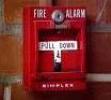
Preparing for The Joint Commission Survey
Next time your systems integrator comes in for the routine fire alarm system inspection, ask for recommendations on preparing paperwork for accreditation.
- By Kurt Canova
- Mar 15, 2013
Hospital preparedness is a necessity, but only one in 20 hospitals are prepared for power disruptions. In its 10th annual "Ready or Not?" report, the Trust for America's Health reveals that 35 states and Washington, D.C. scored a six or lower on 10 key indicators of public health preparedness. The report (http://www.healthyamericans.org/report/101/) found that while there has been significant progress toward improving public health preparedness during the past 10 years, particularly in core capabilities, there continue to be persistent gaps in the country's ability to respond to health emergencies, ranging from bioterrorist threats to serious disease outbreaks to extreme weather events.
States are losing ground in emergency preparedness. Health care professionals need to address these gaps to ensure their staffs are properly trained in emergency evacuation.
Evaluating Your Environment of Care
Today, approximately 82 percent of the nation’s hospitals are accredited by The Joint Commission. It is a leader in setting standards for health care organizations, making it one of the most reliable sources of advancing health care safety. To advance fire and life safety systems and maintain accreditation, hospitals must undergo rigorous, unannounced on-site surveys conducted by an Environment of Care surveyor. Evaluation is based on the following:
- Inspection of the building's fire safety equipment and features
- Compliance with relevant Life Safety Code® requirements set by the National Fire Protection Association (NFPA)
- Staff responsibilities (including orientation, competency, and training of staff)
Surveyors assess the organization's degree of compliance with relevant standards and identify vulnerabilities and strengths in the organization's emergency management processes, structure, operations, and planning activities. The unannounced survey is a validation of an organization's continuous improvement efforts; being properly prepared and trained for a survey could make a difference between a poor report and a Gold Seal of Approval.
The regulatory standards focus on how well an organization documents the maintenance, testing, and inspection activities to ensure the facility is providing a safe environment for patients, visitors, and caregivers. When considering accreditation, how can you ensure a perfect score on your next survey?
The Details in the Documentation
A perfect score depends on how well your organization develops a process to continuously meet ongoing readiness in the life safety and environment of care realm. In order to provide thorough documentation for hospitals to use during The Joint Commission visit, consider the value of having a third party involved in the preparation and documentation process.
The Environment of Care survey consists of two parts: Environment of Care discussion and Environment of Care tracer. The discussion part of the survey will test how well your organization addresses the various Environment of Care risk categories -- general safety and security, hazardous materials and waste, fire safety, medical/laboratory equipment, and utilities -- in each of the following six management processes: plan, teach, implement, respond, monitor, and improve. In preparation for this session, know that the surveyor evaluates an organization’s compliance with the applicable standards in the manual, based on the following:
- Tracing the care delivered to patients
- Verbal and written information provided to The Joint Commission
- On-site observations and interviews by Joint Commission surveyors
- Documents provided by the organization
Benefits of Third-Party Involvement
Accreditation is a continuous process, and health care facilities should consider partnering with their systems integrator to prepare necessary paperwork for The Joint Commission surveyor. For example, intelligent fire alarm systems require quarterly visits to inspect and maintain the systems. Make the best of these routine visits and have your systems integrator regularly report on any vulnerability or gap in the mitigation, planning, response, and recovery categories necessary for a surveyor discussion.
The Joint Commission encourages hospitals to conduct mock on-site surveys in preparation for the actual, unannounced survey. Invite your systems integrators to participate in these mock surveys -- together, you can identify a high risk process or category and, ultimately, modify the process as needed. Additionally, The Joint Commission expects detailed inventory of all fire and life safety equipment, so consider the importance of collaborating with a systems integrator responsible for designing and developing the fire alarm system for your hospital.
The accreditation process provides insight into your organization’s daily operations and systems, and a Joint Commission surveyor will observe how well-trained and prepared your organization’s participants are for the survey. Expect to have your staff describe or demonstrate their roles and responsibilities for minimizing the risk, what they are to do if a problem or incident occurs, and how to report the problem or incident. This is where systems integrators can provide valuable feedback on how well your organization responds to, monitors, and improves its fire and life safety systems.
Preparing for an on-site survey from the Joint Commission can be daunting, and collaboration is key for achieving a perfect score on your survey. Next time your systems integrator comes in for the routine fire alarm system inspection, don't hesitate to ask for recommendations on preparing paperwork for accreditation. After all, preparedness is gaining momentum as the "new normal" for hospitals.